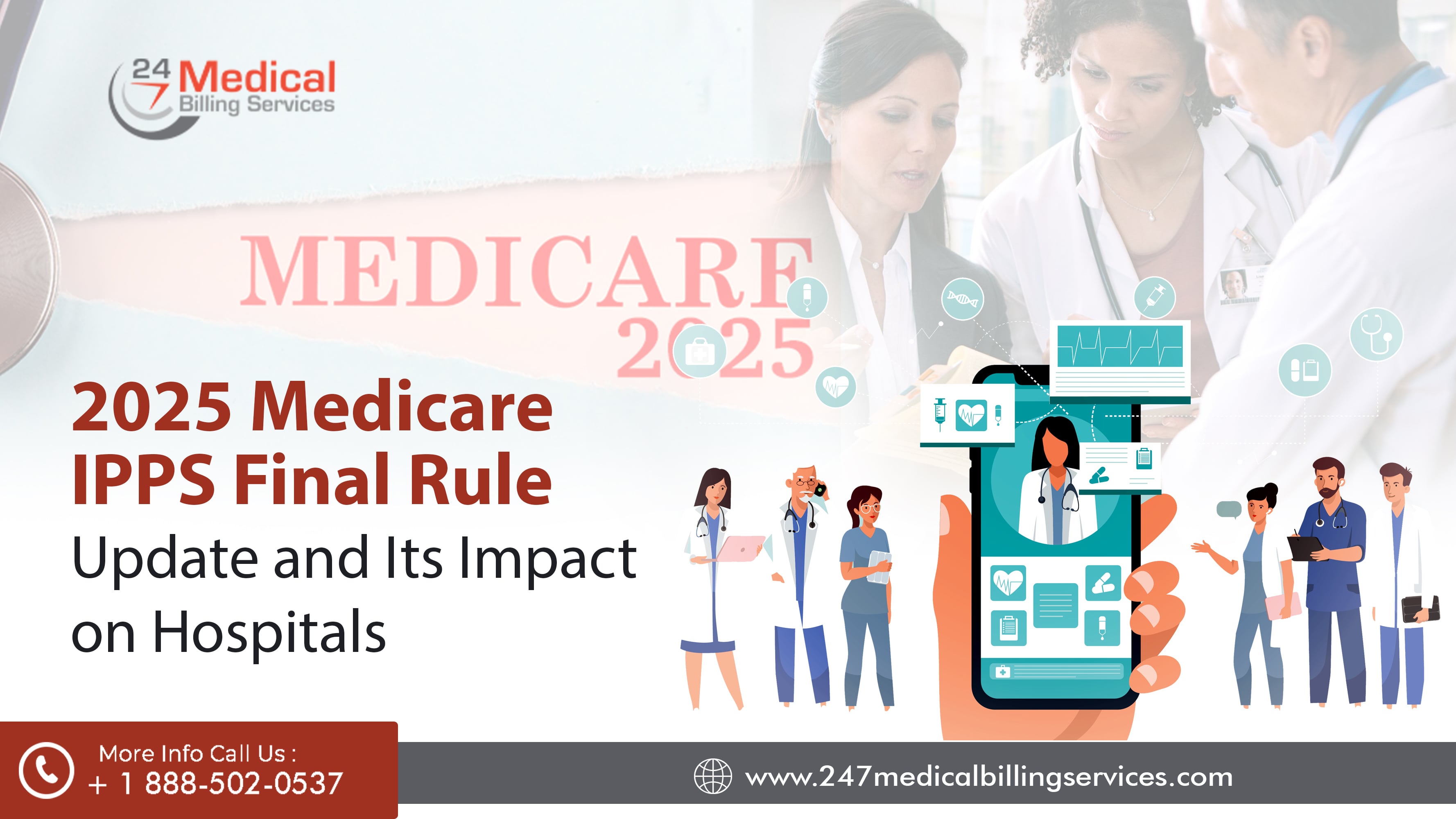
2025 Medicare IPPS Final Rule Update and Its Impact on Hospitals
The 2025 Medicare Inpatient Prospective Payment System (IPPS) Final Rule, issued by the Centers for Medicare & Medicaid Services (CMS) on August 1, 2024, outlines significant updates that will impact hospitals, particularly in the domains of payment rates, quality reporting, and the adoption of new medical technologies. These updates are especially relevant for hospital administrators, medical billing and coding professionals, as they directly influence hospital reimbursement, reporting obligations, and compliance requirements.
The key elements of the Final Rule and its expected impact on hospitals:
1. Increased Payment Rates and Adjustments
CMS has projected an increase in the hospital market basket rate by 3.4% for FY 2025. However, after a 0.5% productivity adjustment, the net increase in payment rates for hospitals that meet reporting and electronic health record (EHR) use requirements is 2.9%. This increase translates into higher reimbursement rates for Medicare patients treated in general acute care hospitals. Billing and coding departments should be prepared to reflect these new rates in their systems, ensuring compliance with CMS payment calculations and regulations. For hospitals failing to comply with the Inpatient Quality Reporting (IQR) Program or not being meaningful EHR users, payment updates will be reduced, underscoring the importance of maintaining compliance with CMS quality standards and EHR guidelines.
2. New Technology Add-On Payments (NTAP)
For 2025, CMS has approved additional payments for inpatient cases involving new medical technologies, totaling an increase of approximately $0.3 billion. This will allow hospitals to recoup a portion of the costs for high-cost, advanced medical technologies that enhance patient care but are not yet fully integrated into standard Medicare payment rates. Coding professionals should become familiar with the specific technologies that qualify for NTAP and ensure accurate coding to facilitate proper reimbursement. Additionally, CMS will move the NTAP eligibility start date to October 1 beginning in 2026, which will standardize the timeline for determining new technologies' eligibility and align it with the fiscal year.
3. Adjustments to Medicare Uncompensated Care Payments
CMS has projected a decrease in Medicare uncompensated care payments by about $0.2 billion for disproportionate share hospitals (DSH) in FY 2025. DSH hospitals, which serve a high number of low-income patients, rely on these payments to offset uncompensated care costs. This reduction may create financial pressures on DSH hospitals, especially those in economically disadvantaged areas. Medical billing departments will need to carefully monitor DSH payments and calculate expected reductions in reimbursement, adjusting budget forecasts accordingly.
4. Hospital Inpatient Quality Reporting (IQR) Program
The IQR Program has undergone multiple changes, including the adoption of seven new quality measures and the removal of five existing ones. Notably, the new measures include two electronic clinical quality measures (eCQMs): Hospital Harm - Falls with Injury and Hospital Harm - Postoperative Respiratory Failure. Additionally, structural measures, such as the Age-Friendly Hospital Structural Measure, are now required. Coders and billing professionals should be aware of these reporting changes, as hospitals failing to report on these measures could face payment penalties. CMS also finalized progressive increases in the mandatory eCQM reporting requirements, with hospitals required to report on up to eleven eCQMs by 2028.
5. Implications of the Medicare Promoting Interoperability Program
CMS has increased the scoring threshold for the Promoting Interoperability Program from 60 to 70 points in 2025, with an additional rise to 80 points starting in 2026. Hospitals must now report on a more extensive set of eCQMs, including Hospital Harm measures, to fulfill the program’s requirements. Additionally, CMS is separating the Antimicrobial Use and Resistance (AUR) Surveillance measure into two distinct components, which are now considered separate measures. Medical billing and coding professionals must be adept at handling the increased requirements to avoid penalties. Ensuring interoperability compliance and meaningful EHR use is essential to avoid reductions in payment updates.
6. New Quality Measures and Reporting Standards
CMS is adding several infection-related measures to improve patient safety, including measures for catheter-associated urinary tract infections and central line-associated bloodstream infections, which will be stratified for oncology locations. A new measure, the Thirty-Day Risk-Standardized Death Rate among Surgical Inpatients with Complications, is set to replace the CMS PSI-04 measure, broadening its applicability. These changes reflect CMS’s emphasis on patient safety and quality improvement, both of which impact reimbursement.
Billing and coding teams must be aware of these new reporting requirements and ensure that appropriate documentation is in place. For example, adding more specific diagnostic codes related to these conditions may help in accurately capturing the required data, ultimately affecting reimbursement rates.
What’s Next?
The 2025 IPPS Final Rule introduces numerous reporting and reimbursement requirements, demanding heightened accuracy in medical billing and coding. Coding professionals must stay informed about the specific codes for new medical technologies, quality measures, and SDOH assessment items. In addition, hospitals should invest in regular training for billing and coding teams to ensure compliance with the updated measures. Misreporting or failure to meet CMS’s quality and interoperability standards could lead to substantial payment reductions.
Alternatively, Outsourcing medical billing and coding to 24/7 Medical Billing Services (24/7 MBS) offers hospitals a practical way to adapt to the complex changes introduced by the 2025 Medicare IPPS Final Rule. With the rule's updates, medical billing has become more intricate and demands extensive accuracy and expertise. 24/7 MBS can help hospitals navigate the new guidelines, especially those concerning the Medicare Inpatient Quality Reporting (IQR) program and electronic clinical quality measures (eCQMs), ensuring compliance to avoid potential payment penalties.

.png)